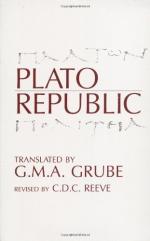|
This section contains 794 words (approx. 3 pages at 300 words per page) |

|
Plato and His World of Forms
Summary: This discussion explores Plato's concept of forms - their definition and what they represent. His forms are archetypes of material objects, do not exist materially in time or space, and are symmetrically interconnected. Also discussed is Plato's theory on the nature of existence.
Plato's introduction of the world of forms a try to clarify the nature of qualities of the material and imaginary objects. He was trying to find the answer to how do we know if something has certain properties or not. In order to do so he has created a world where the human spirits saw the shadows of the perfect objects called forms. The knowledge is innate and learning is just a process of recalling the memories from the world of forms. The better one can remember how things were in this special world, the more success will he have in learning new things. For example, Plato would say that we know what a table is, because we saw a perfect table before.
The other reason was Plato's will to find out more about the firm foundation for ethical values. He was interested in the meaning of justice...
|
This section contains 794 words (approx. 3 pages at 300 words per page) |

|


